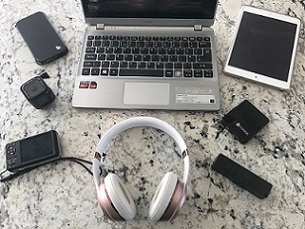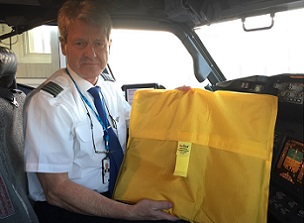 All these personal electronic gadgets are powered by lithium batteries
All these personal electronic gadgets are powered by lithium batteries
 Diverting planes due to lithium battery incidents can be very expensive
Diverting planes due to lithium battery incidents can be very expensive
 A pilot holding an AvSax lithium battery fire containment bag
A pilot holding an AvSax lithium battery fire containment bag
 The last place you’d want a lithium battery fire is in the confined space of a passenger aircraft which is why AvSax lithium battery fire mitigation bags are so important
The last place you’d want a lithium battery fire is in the confined space of a passenger aircraft which is why AvSax lithium battery fire mitigation bags are so important
A laptop fire forced a passenger jet to divert and make an emergency landing … the second laptop blaze on board an aircraft in the USA in just three days.
The Lufthansa plane flying from California to Germany diverted to Chicago’s O’Hare International Airport on Boxing Day after a passenger’s laptop overheated in the cabin, sparking a small fire.
The incident was reported by NBC 5 in the US , quoting a statement from Lufthansa which said: “The small fire was extinguished in flight before its safe landing. Safety on board was not compromised at any time.”
The statement added that none of the passengers onboard were injured but two flight attendants were treated for smoke inhalation.
The drama followed an incident on Christmas Eve when several passengers were hurt after a fire on a plane at New York’s JFK airport was triggered by a lithium-ion battery in a laptop. These two incidents are the latest in a growing number of fires in passenger planes caused by lithium batteries in personal electronic devices ranging from mobile phones and iPads to vapes and laptops.
The Christmas Eve fire was on board a JetBlue flight arriving at JFK. The plane had just landed from Bridgetown in Barbados and arrived at the gate at Terminal 5 when smoke was spotted coming from the laptop in the cabin.
Due to the potential danger of a lithium battery fire – they quickly heat up, give off toxic smoke and the device could even explode - the captain ordered the plane to be evacuated.
This meant some of the 167 passengers used the escape chute where several suffered minor injuries.
JetBlue later issued a statement confirming the evacuation was due to “reports of a customer’s malfunctioning electronic device or battery.”
The problem with lithium batteries is that they can go into what’s known as thermal runaway.
This happens when one cell in a battery overheats it can produce enough heat – up to 900°C (1652°F) – to cause adjacent cells to overheat. This can cause a lithium battery fire to flare repeatedly and they are then very difficult to put out due to their intensely high temperatures. They can even explode so these fires are the last thing you’d want to face in the confined space of a passenger aircraft.
Many airline operators now have special lithium battery fire containment bags on board and the best-selling one by far is the award-winning AvSax (www.avsax.com) which are now on more than 16,770 aircraft operated by over 100 airline companies worldwide.
They have been used 33 times to deal with emergencies since the start of 2017 and every time they have been deployed the aircraft has been able to complete its journey safely with no need to divert or make an emergency landing.
AvSax, invented by UK-based Environmental Defence Systems, won the prestigious Queen’s Award for Enterprise in the UK in 2018, the highest award any business can get.
Many air ambulance helicopters in the UK now carry AvSax. More than 20 helicopters operated by specialist aerial emergency medical services company Babcock were equipped with AvSax following a detailed look into the possible risks posed by lithium-ion batteries on aircraft.
The danger posed by lithium batteries means they must always be carried in the cabin so the crew can deal with any fire should the worst happen.
They must never be in the luggage hold as automatic fire suppression systems could struggle to cope with a fire of such intensity. The batteries and devices would be surrounded by clothes and other combustible materials so any fire could quickly take hold.
Cabin crew now often warn people in the safety briefing to alert them immediately if they lose their phone or any other personal electronic device down their seats. This is because if they move their seat the mechanism could crush the battery, sparking a fire.